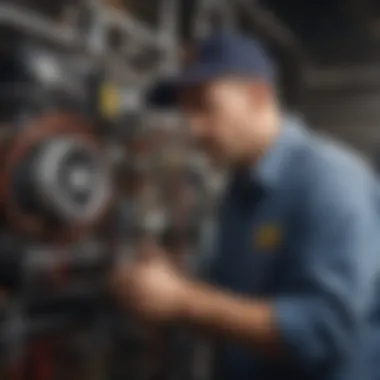Entry Level HVAC Technician Salary Insights


Overview of the Topic
Definition and Importance
An entry level HVAC technician plays a crucial role in maintaining heating, ventilation, and air conditioning systems. These professionals, often the first point of contact for customers, ensure that systems operate efficiently and safely. Understanding the salary expectations for entry level HVAC technicians is significant not just for prospective employees but also for employers and industry stakeholders. The salary can influence career decisions and shape the workforce in the HVAC sector.
Current Trends
The HVAC industry is rapidly changing, influenced by advancements in technology and increased demand for energy-efficient systems. With more businesses and homes being constructed, the need for skilled technicians rises. This leads to variations in salary based on location, education, and industry demand.
Key Influencing Factors
Understanding salary expectations requires examining various influencing factors. Here are the key aspects:
- Geographical Location: Salaries vary widely based on where one works. Urban areas, where the cost of living is higher, usually offer better wages.
- Level of Education: Technicians with formal training or an associate degree may command higher salaries than those without.
- Certifications: Additional certifications, such as the EPA Section 608 certification, can markedly enhance earning potential.
- Industry Demand: Areas experiencing high demand for HVAC services tend to provide better pay.
Challenges and Solutions
Common Obstacles
Entry level HVAC technicians often face challenges that may affect their salaries and job satisfaction. Common obstacles include:
- Limited Experience: Fresh graduates may start with lower salaries due to a lack of practical experience.
- Fluctuating Demand: Some regions experience seasonal fluctuations that can affect job stability.
- Skill Requirements: Keeping up with new technologies requires ongoing education and training.
Innovative Solutions
To navigate these challenges, both technicians and employers can implement various strategies:
- Continued Education: Engaging in further training and certifications can elevate the skill level, allowing for higher wages.
- Networking: Professionals should consider joining industry groups and online communities (like those on Reddit) to exchange knowledge and job opportunities.
- Mentorship Programs: These can bridge the experience gap, offering guidance to newcomers while providing seasoned professionals with opportunities to mentor.
"Understanding salary components for entry level HVAC technicians helps in making informed career decisions."
Looking at various influences and solutions will allow both technicians and businesses to adapt to evolving market demands.
Understanding the HVAC Technician Role
The role of an HVAC technician is critical in the modern economy. These professionals ensure that heating, ventilation, and air conditioning systems operate efficiently and effectively. Without their expertise, both residential and commercial environments would struggle to maintain comfortable and safe living or working conditions. In this article, we will examine the significance of this role, especially for those considering a career in this field.
A technician's responsibilities vary widely. They include installation, maintenance, and repair of HVAC systems. The need for these skilled workers has grown, influenced by various factors including technological advances and climate-related concerns. As such, understanding this role is essential for anyone contemplating entering the HVAC field.
Definition and Responsibilities
HVAC technicians are specialized tradespeople. They handle systems that control the temperature and air quality of buildings. This often involves working with complex equipment and controlling systems which require a range of knowledge and skills.
The primary responsibilities include:
- Installation: Setting up new heating and cooling systems according to specifications.
- Maintenance: Performing routine checks to ensure systems are functioning optimally. This may involve cleaning filters, checking refrigerants, and tightening loose components.
- Repair: Troubleshooting and fixing problems as they arise. This could mean replacing faulty parts or making adjustments for efficiency.
- Customer service: Communicating with clients to understand symptoms and establish needs. A technician's ability to explain technical issues in layman's terms can significantly enhance customer satisfaction.
Techs might also specialize in different areas of HVAC. Some may focus on refrigeration systems, while others might work with commercial climate control units. Understanding the nuances of these roles is key when discussing entry-level salaries, as specialization often correlates with pay grade.
Skill Set Required for Success
To excel as an HVAC technician, certain skills are required. These can be categorized broadly into technical skills and soft skills.


Technical Skills:
- Mechanical aptitude: A strong understanding of mechanical systems is vital. Technicians must know how to operate and repair various equipment.
- Electrical knowledge: Since many HVAC systems incorporate electrical elements, having an understanding of electrical systems is crucial.
- Problem-solving skills: Technicians must quickly diagnose issues with systems. This requires analytical thinking and hands-on experience.
- Safety knowledge: Understanding safety procedures and regulations is crucial in this industry. A technician must ensure compliance with local laws and standards.
Soft Skills:
- Communication: Being able to convey technical information clearly to clients is necessary for building trust.
- Customer service: A positive attitude and professional demeanor can enhance client relationships.
- Time management: Technicians often juggle multiple jobs in a day, so prioritizing tasks is important.
Acquiring these skills often comes from a combination of formal education, hands-on training, and workplace experience. Technicians who invest time in honing their abilities frequently find better career opportunities and potential for higher salaries.
Overview of Entry Level Salaries
Understanding entry level salaries for HVAC technicians is crucial for both aspiring professionals and industry stakeholders. This section aims to shed light on the financial landscape that new entrants into the field can expect. Several factors play a role in shaping these salary figures, including industry dynamics, geographic location, and skill levels. By grasping these elements, one can make informed decisions about pursuing a career in HVAC.
Current Salary Trends
Recent data indicate that entry level HVAC technicians typically earn between $30,000 and $48,000 annually. This range can fluctuate based on various factors, such as the location of employment, specific industry, and prevailing economic conditions. Moreover, growing demand for energy-efficient solutions has fueled increases in starting salaries within the HVAC sector. Technicians equipped with knowledge of modern HVAC systems, particularly those that are eco-friendly, may position themselves advantageously in the job market.
"The demand for skilled HVAC technicians is projected to grow significantly in the coming years, as energy-efficient systems become a priority for homeowners and businesses."
Certifications also impact salary trends. For example, those who complete apprenticeship programs or obtain certifications from reputable organizations like the Refrigeration Service Engineers Society can command higher starting salaries. Additionally, market competition among employers can lead to more attractive salary packages to attract qualified candidates.
Comparison to Other Trade Positions
When compared to other trade positions, entry level salaries for HVAC technicians are relatively competitive. For instance, electricians and plumbers also see starting salaries in a similar range, but their earning potential may vary based on regional market demand. In some regions, electricians can earn more due to higher demand for residential and commercial wiring expertise.
However, HVAC technicians often enjoy greater job stability. As HVAC systems are essential year-round, the need for maintenance and repair services remains constant. This distinct embedded relevance within the infrastructure of homes and businesses often leads to more predictable income streams for technicians. Moreover, the HVAC field offers clear pathways for specialization, allowing individuals to advance their careers significantly by focusing on niche areas like refrigeration or indoor air quality.
In summary, comprehending the nuances of entry level salaries in the HVAC field is essential. As trends evolve, aspiring technicians should consider not only salary figures but also the benefits and growth potential associated with a career in HVAC.
Factors Affecting Salary
Understanding the factors that influence the salary of entry level HVAC technicians is crucial for both aspiring professionals and employers alike. These variables play a significant role in determining how much a technician can expect to earn in their initial years of work. Examining each of these factors can help individuals make informed decisions about where to live, how to enhance their qualifications, and ultimately increase their earning potential.
Geographical Location
The geographical location is one of the most influential factors affecting the salary of an HVAC technician. Salaries differ significantly from one state or region to another. For example, technicians in urban areas often earn more due to higher living costs and greater demand for services. In contrast, rural areas may offer lower wages, but the cost of living is also reduced.
Additionally, specific states like California and New York typically have higher average salaries for HVAC technicians compared to states in the Midwest or South. It is essential for technicians to research local salaries and costs when considering job opportunities.
Industry Demand and Economic Conditions
The demand for HVAC services can greatly impact salary levels. In times of economic growth, businesses often expand, creating more demand for HVAC technicians. Seasonal fluctuations also play a role; during summer and winter months, technicians may find more work than during the spring and fall.
Economic conditions such as housing market trends also affect job availability. A booming real estate market usually results in higher demand for HVAC installation services. Therefore, technicians should monitor economic indicators to gauge potential salary increases tied to demand.
Experience and Skill Level
Experience and skill level are also critical in determining salary. Entry level technicians may start with lower wages but can significantly increase their earnings through on-the-job experience and specialized skills. Over time, as a technician develops a reputation and gains knowledge, they may qualify for higher paying positions or supervisory roles.
Additionally, having specialized skills, such as knowledge of energy-efficient systems or advanced diagnostic equipment, can set a technician apart from peers. Those with more experience or specialized skills tend to command a higher salary.
Certification and Training Programs


Certifications can have a significant impact on salary potential. Various programs offer specialized training that can enhance a technician's skills and marketability. For instance, certifications from the Refrigeration Service Engineers Society or North American Technician Excellence can demonstrate expertise to employers.
Participating in ongoing education and certification programs not only increases a technician's knowledge but also often results in higher pay. Certifications show a commitment to the profession and a desire to uphold standards, making those technicians more appealing to employers.
"Investing in certification and continuous education can pay off significantly in terms of salary and job security."
Geographical Salary Variations
Understanding geographical salary variations is crucial for entry-level HVAC technicians, as these differences can significantly impact financial expectations and job opportunities. Factors such as cost of living, regional demand, and local economic conditions contribute to how much technicians earn in different areas. Technicians aiming to build a successful career must take these variations into account when considering job offers or career moves.
East Coast Salaries
In the Eastern United States, salaries for entry-level HVAC technicians tend to be higher relative to the national average. States like New York and Massachusetts often report salaries that appeal to newcomers in the field. However, the cost of living in these areas is also quite high, which can offset higher wages. Generally, newcomers may see starting salaries ranging from $40,000 to $50,000 per year. This region’s climate, which includes a mix of heating and cooling needs, drives demand for qualified technicians. Moreover, urban centers in this region like Boston and Washington D.C. provide ample job opportunities, but they also require technicians to adapt to fast-paced work environments.
Midwestern Salaries
Compared to the East Coast, entry-level salaries in the Midwest are often lower, averaging between $35,000 and $45,000 annually. However, the lower cost of living in states like Ohio and Indiana can make these salaries more appealing. As cities in the Midwest continue to grow, the demand for HVAC technicians remains steady. Moreover, the seasonality of weather plays a role in job security within the region; technicians may find more work during extreme weather conditions, but the warmer months could present challenges in job availability. It is crucial for a technician to consider work stability and growth opportunities within this context.
West Coast Salaries
The West Coast showcases considerable variability in entry-level HVAC salaries. California leads with some of the highest wages in the nation, often exceeding $50,000 for new technicians. However, similar to the East Coast, the cost of living in metropolitan areas like San Francisco and Los Angeles is significantly high. On the other hand, states like Oregon and Washington also report competitive entry-level salaries while maintaining a relatively moderate cost of living. Moreover, the West Coast’s diverse climate and stringent energy efficiency regulations create a robust demand for skilled HVAC technicians. Thus, understanding specific regional factors is essential for technicians looking to maximize their earnings potential.
Implications of Certifications
Certifications in the HVAC industry carry considerable weight. They serve as both a verification of skill and a testament to a technician's commitment to their craft. For entry-level HVAC technicians, obtaining certifications can significantly influence one’s career trajectory and salary potential. Not only do these qualifications enhance knowledge, but they also improve job prospects in a competitive marketplace.
Employers often prioritize hiring individuals who are certified, particularly in a field that demands adherence to safety standards and regulations. This is especially relevant as technology in the HVAC sector continues to evolve, with new systems and practices emerging regularly. Therefore, being certified opens doors to advanced and specialized roles beyond the entry-level position.
Additionally, certifications may form part of legal requirements in some regions, stressing their importance not just for personal development, but also for professional compliance. These credentials can also instill customer confidence. Clients are more likely to trust and hire technicians who display recognized certifications, ensuring their HVAC systems are in capable hands.
Types of HVAC Certifications
Various types of certifications are available for HVAC technicians, each serving distinct purposes. Some popular certifications include:
- EPA 608 Certification
Required for technicians who work with refrigerants, this certification ensures that individuals understand the proper handling and disposal of such materials in compliance with environmental regulations. - NATE Certification
The North American Technician Excellence (NATE) certification is widely recognized within the industry. It validates a technician's expertise in specific areas of HVAC technology. - HVAC Excellence Certification
This certification focuses on both knowledge and practical skills. It offers several specialized certifications based on specific HVAC systems and technology. - RSES Certification
The Refrigeration Service Engineers Society offers this credential for those focused on refrigeration service and troubleshooting techniques.
Each certification requires a combination of coursework and practical experience, emphasizing comprehensive knowledge in HVAC systems.
Impact on Salary Potential
The impact of certifications on salary potential for entry-level HVAC technicians can be profound. Technicians who possess recognized certifications can often command higher starting salaries compared to their uncertified counterparts. The difference in hourly rates may reflect several compelling factors:
- Increased Job Opportunities:
Certified technicians are generally preferred in the hiring process. More options in the job market could lead to better salary negotiations. - Higher Wage Ceiling: With certifications, technicians can aspire to advanced positions through further specialization, thus also increasing their earning potential over time.
- Skill Validation: Certifications validate a technician’s skills and knowledge. This leads to trust from employers, who may offer premium salaries to retain skilled personnel.
Research shows that HVAC technicians with NATE certification can earn up to 15% more than those without.
Job Market Outlook
The job market outlook for entry-level HVAC technicians is crucial for understanding the career trajectory in this field. Factors such as demand for HVAC services, technological advancements, and industry trends directly affect salary expectations and job stability. These insights not only benefit aspiring technicians but also provide relevant context for employers and industry stakeholders.
Projecting Future Demand
The demand for HVAC technicians is anticipated to grow significantly in the coming years. This growth is not random, but stems from essential factors driving the industry. As the climate continues to change, there will be increased need for heating, ventilation, and air conditioning systems in both residential and commercial settings. Furthermore, the construction industry is expected to rebound, leading to new buildings requiring HVAC installation.


Additionally, older systems in existing buildings are likely to need replacement, adding to the demand for qualified technicians. According to the U.S. Bureau of Labor Statistics, employment for HVAC technicians is projected to grow by 13% from 2020 to 2030, which is faster than the average for all occupations. This robust demand ensures ample job opportunities for those entering the field.
"The growth forecast in the HVAC sector reflects broader economic trends and the increasing emphasis on energy efficiency."
Emerging Technologies in HVAC
Innovations are reshaping the HVAC landscape. Technological advancements are integral to improving efficiency and sustainability. Smart HVAC systems, which include programmable thermostats and IoT capabilities, are gaining traction. These systems not only optimize energy usage but also provide single points of control for users.
Moreover, refrigerants have seen regulatory changes aimed at reducing environmental impact. Technicians must stay abreast of these innovations, adapt to new equipment, and understand the complexities of modern systems.
Training programs increasingly incorporate new technologies, preparing technicians to meet these demands. It is essential for upcoming HVAC professionals to embrace these changes, as they directly correlate to job prospects and salary opportunities. The integration of technology in HVAC systems will enhance the skill set required for future technicians, making continuous education crucial in this field.
Potential for Advancement
The potential for advancement plays a critical role in understanding the career trajectory of entry-level HVAC technicians. Unlike many fields, HVAC offers multiple pathways for growth and development. Technicians often start in hands-on, service-oriented roles but can aspire to positions in management, engineering, or specialized technical roles. Recognizing these opportunities is essential for anyone considering a career in this industry.
Entry-level technicians begin by mastering fundamental skills that include repair, maintenance, and installation of HVAC systems. As technicians become more experienced, they may pursue further education or acquire certifications, enhancing their skill set. This investment in personal and professional development often leads to increased responsibilities and increased salary potential.
Career Progression Paths
The journey for HVAC technicians typically starts with an entry-level position. From there, they can progress in various ways:
- Service Technician to Lead Technician: As technicians gain experience, they may lead small teams on job sites, overseeing projects and training newer recruits.
- Specialist Roles: Technicians can specialize in areas like refrigeration, indoor air quality, or energy management, often leading to higher pay and demand for their specific expertise.
- Management Opportunities: With sufficient experience, technicians may move into supervisory or managerial roles, such as Operations Manager or HVAC Project Manager. These roles often involve overseeing large projects and coordinating teams.
- Entrepreneurship: For those with an entrepreneurial spirit, starting an HVAC business can be the ultimate career progression. It allows for independence and the potential for high income.
Strategies for Salary Growth
Achieving salary growth in the HVAC field requires strategic planning and proactive steps. Here are several tactics:
- Continued Education: Pursuing formal education, such as an associate degree in HVAC, can provide a strong advantage in understanding complex systems and emerging technologies.
- Certifications: Obtaining relevant certifications, like those from the North American Technician Excellence (NATE) or the Environmental Protection Agency (EPA), can significantly enhance marketability and salary potential.
- Networking: Building relationships within the industry can open doors to job opportunities that may not be advertised widely. Engaging with professional HVAC organizations on platforms like reddit.com may provide insights into industry trends.
- Staying Current: Keeping up with the latest technologies and industry developments is crucial. For example, understanding smart HVAC systems can set technicians apart in a competitive job market.
- Negotiation Skills: Developing strong negotiation skills can be beneficial when discussing salary and benefits with employers. Knowing one’s worth based on skills, experience, and local market trends can empower technicians when seeking pay raises.
"Career advancement is not just about moving up. Sometimes, it’s about becoming better at what you do and increasing your value in the workplace."
By implementing these strategies, entry-level HVAC technicians can effectively increase their earning potential and secure a more advanced position within the industry.
End and Recommendations
In an evolving job market, understanding the dynamics of entry-level HVAC technician salaries is crucial. This article has analyzed various factors that influence these salaries, giving readers a nuanced view of what to expect in their careers. One significant aspect is the importance of certifications. Obtaining specialized credentials can significantly enhance earning potential and job opportunities. Employers often prefer candidates with recognized certifications, as it reflects a commitment to the profession and a level of competency.
The geographical location of a technician also plays a key role in salary determination. Places with a high cost of living, like California, tend to offer larger salaries to accommodate financial demands. Meanwhile, emerging technologies in HVAC are transforming the industry. Familiarity with these advancements can increase a technician's value in the job market. Additionally, the potential for career advancement is significant. Those willing to pursue training and on-the-job experience can ascend to higher-paying roles.
For aspiring technicians, it's vital to remain informed about market trends and educational opportunities. Understanding these elements can guide career decisions, allowing for strategic planning in terms of skills acquisition and job applications. A focus on continuous learning will serve as an invaluable asset throughout one’s career.
"In today's HVAC industry, those who adapt to change are often the ones who thrive."
In summary, navigating the landscape of entry-level HVAC technician salaries requires a comprehensive approach. By prioritizing education, certifications, and adapting to industry changes, aspiring technicians can enhance their career prospects effectively.
Final Thoughts on Entry Level Salaries
Entry-level salaries for HVAC technicians vary greatly, influenced by different factors as explored in this article. On a general note, the starting salary may seem modest when compared to other skilled trades. However, this initial pay can increase significantly over time with experience and additional training. The HVAC field is characterized by steady demand, which reinforces the long-term viability of pursuing a career in this area.
The salary prospects reflect both the challenges and rewards that come with this profession. As technicians gain expertise, they may find opportunities in specialized areas, which command higher pay rates. Moreover, with the shift towards energy-efficient systems, technicians skilled in these technologies will likely see increased demand.
Overall, understanding the entry-level salary landscape empowers aspiring technicians to make informed choices that can influence their financial success in the long-term.
Guidance for Aspiring Technicians
For those considering a career as an HVAC technician, proactive preparation can be pivotal. Here are several recommendations that can assist in entering the field and achieving long-term success:
- Research Training Programs: Comprehensive training is essential. Investigating programs that offer hands-on experience can provide practical skills that are appealing to employers.
- Consider Certifications: Investing time in obtaining certifications such as EPA 608 can enhance your job prospects. Many employers prioritize candidates with these credentials.
- Stay Current with Technology: Continuous learning is key. Follow industry trends and new technologies to make yourself an in-demand candidate.
- Networking: Building relationships within the industry can open doors. Attend relevant workshops or join HVAC forums on platforms like Reddit or Facebook. Your network can provide valuable insights and job opportunities.



